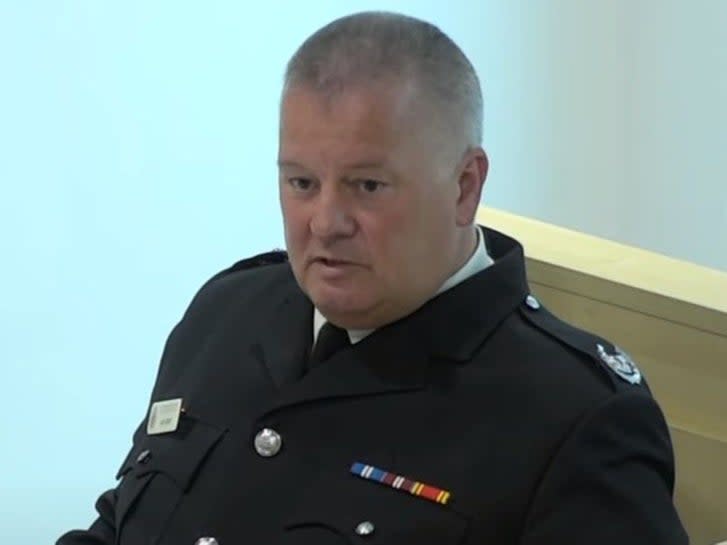Manchester Arena bomb inquiry: ‘Nightmare journey’ delayed senior firefighter’s response, inquiry told

A firefighter who was on duty the night an Ariana Grande concert was targeted by a suicide bomber got lost on a “nightmare journey” to a meeting point he had suggested, an inquiry has heard.
Andy Berry said about 10 minutes after the bomb went off, he chose to meet colleagues at Philips Park Fire Station, three miles away from the arena – a safety precaution taken in case other terrorists were on the loose.
His decision meant all crews based in the city centre moved away from the arena, the inquiry was told. Firefighters eventually took more than two hours to attend the bombing in May 2017.
While the drive from Mr Berry’s home in the Wigan area to Philips Park would normally take 35 minutes with blue lights on, he said he was “significantly hampered” by a number of roadworks causing the trip to instead last 56 minutes.
He said he had “trusted in his satnav” to get him there on time, but he actually ended up arriving at the same time as the final living casualty was being evacuated from the City Room foyer, where Salman Abedi detonated his bomb at 10.31pm on 22 May.
He told the inquiry, taking place at Manchester Magistrates’ Court, that he was made aware before he set off that there were likely to be road closures.
Counsel to the inquiry Paul Greaney QC agreed Mr Berry was obstructed and diverted from the route he had chosen.
“The satnav took you along a number of winding country roads?” Mr Greaney asked.
Mr Berry replied: “It did.”
Mr Greaney then asked: “You didn't really have the faintest idea where you were?”
Mr Berry responded: “I didn't.”
The firefighter then agreed the circumstances were not “likely to aid dynamic decision-making”.
Mr Berry was performing the tactical role of duty NILO (national inter-agency liaison officer) on the night, with responsibilities including giving advice to his commanders and other agencies.

The inquiry heard how, during his journey, Mr Berry repeatedly tried without success to contact Greater Manchester Police’s (GMP) force duty officer, the initial commander of the incident, and also took calls from colleagues as he told them about his “nightmare journey”.
Mr Greaney said North West Fire Control rang Mr Berry at 10.57pm, by which time it was known that GMP officers were on the scene, along with an ambulance service commander, and that the injuries looked like shrapnel wounds rather than from gunshots – but the information was not passed on to him.
Asked what he would have done then if he had that information, Mr Berry said: “Well, we would have quite clearly deployed probably straight to the Arena, proceeding with caution.”
Mr Berry also agreed that, had he remained at home, where he had access to work logs on his computer, he would have gained earlier situational awareness and again deployed to the scene earlier.
The inquiry heard that further updates from the scene, at about 11pm, from British Transport Police also failed to reach Mr Berry.
Mr Greaney put it to the firefighter that an “extraordinary feature” of what went wrong on the night was that he and senior colleagues lacked situational awareness but firefighters waiting on the ground at Philips Park knew what was happening.
“Is it fair to say this is an extraordinary state of affairs that the troops on the ground have situational awareness, that’s why they are so desperate to get there, and the bosses don’t?” he asked.
Mr Berry replied: “We were all desperate to get there and all frustrated on the night. That information was never shared with me.”
He ultimately admitted he made mistakes on the night but said it was “never foreseeable” the fire service could not get hold of GMP’s force duty officer – and apologised if any of his decisions “impacted on the response on the night”.
The inquiry continues.
Additional reporting by PA
Read More
UK weather: The latest Met Office forecast
Manchester Arena inquiry report: All the missed security opportunities before bombing that killed 22
Inquiry slams security faults before Manchester Arena attack

 Yahoo Finance
Yahoo Finance 